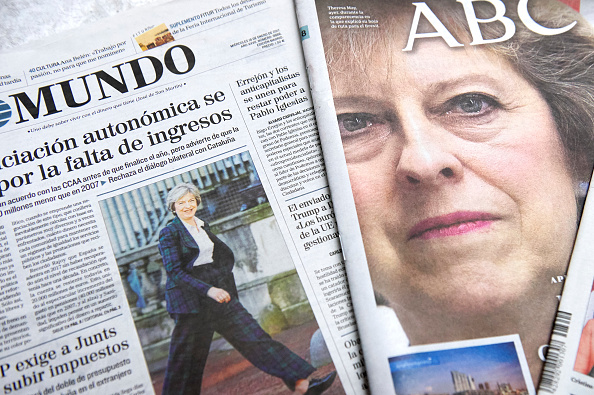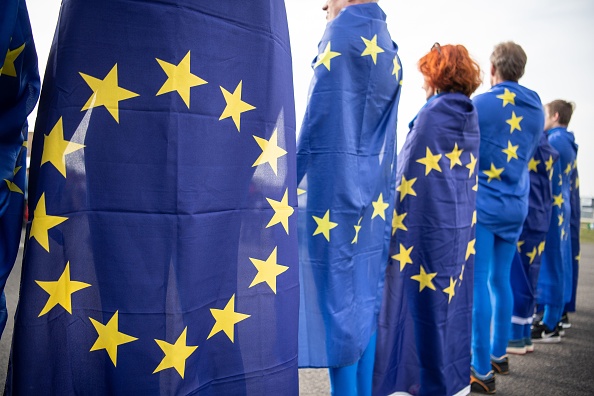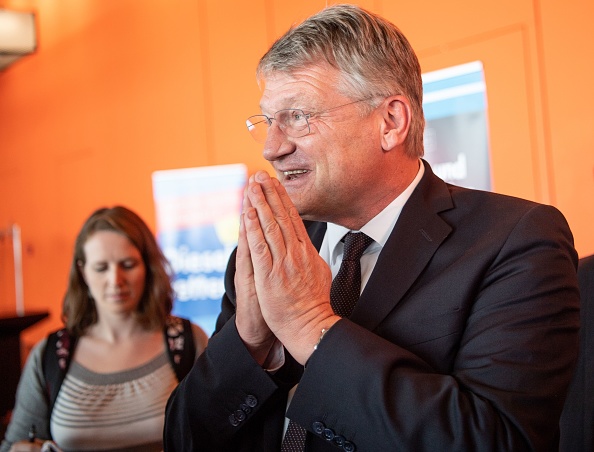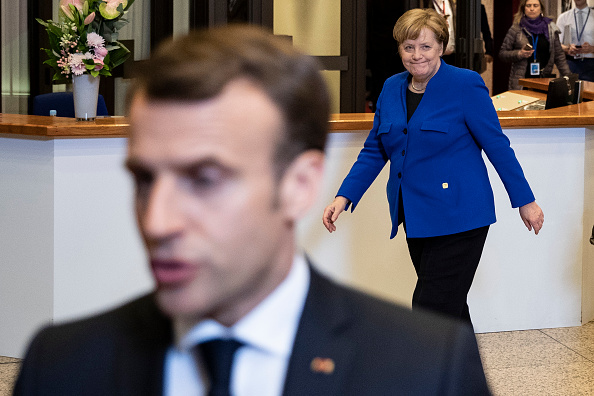MEDIA COVERAGE FROM EUROPE
As the Brexit deadline loomed ever closer, Europe’s media came to believe that it was time that the EU took over the Brexit process to save the British government from its state of increasing chaos and confusion. Germany’s Die Zeit said the EU27 had “firmly taken the lead in the Brexit chaos, and ruled out a disorderly Brexit – for the time being,” which they wrote was a reaction to May’s disappointing presentation which “obliged the EU to take over the job.”
Spain’s El Pais was equally critical of the Prime Minister’s performance. The paper wrote that the EU’s plan “basically boiled down to a short extension with May or a long extension without her”. The sensation of “being in negotiations with a prime minister who is unable to find a viable solution has hardened the position of most member states”, the paper said.
France’s Le Monde wrote that Europe’s plan is “to avoid May’s trap, which was either to blame the EU27 for a chaotic no-deal Brexit or shatter its unity and win an unconditional delay for Brexit”.
Marc Roche, Le Monde’s former correspondent in London says that “In some parts of the French elite, Brexit is seen as a catastrophic mistake that will make you the new sick man of Europe.”
During the anti-Brexit demonstration in London on March 23, the European media covered the event in “ill-concealed relish”, reported the Guardian. France’s Le Monde praised the crowd, which was estimated at 1 million people, as “calm but determined, a sea of European blue…with not a single policeman in sight, but not a single incident either.” The protest was “rather more about the failings of Theresa May’s government, and rather less about Europe” when compared to previous anti-Brexit marches, Le Monde wrote.
Germany’s Die Zeit commented on the UK’s meltdown and the timing of the demonstration which it wrote came “at the end of one of the most dramatic weeks in British politics in many years … May’s negotiations with the EU have failed, she has lost control of the Brexit process, and the danger of a no-deal Brexit looms”
While European press coverage of the Brexit appears to be increasingly critical of Theresa May’s handling of the process, a study of European media coverage of Brexit published in July 2018 by Reuters Institute for the Study of Journalism at the University of Oxford in cooperation with the media research specialist, PRIME Research, found that almost 80 percent of the news items adopted fact-based neutral position when reporting the Brexit negotiation. Where a vow was taken, it was mostly negative towards Britains decision to exit the EU and the way in which the government had handled the process. The study also found that while the media across the continent followed the Brexit debate closely, they appeared unconcerned about the UK’s EU departure - regarding it as Britains own problem rather than a collective challenge for Europe which would impact their own country’s national interests.
“Only one in ten reports, on average, covered the issue from a perspective of national self-interest. However, there was a notable variation between countries. French media reported Brexit as more of a challenge for the United Kingdom rather than for the French or the EU; interest in the future of the EU was highest in Sweden and Greece. Spanish and Irish media, in particular, expressed a strong view against Brexit, while Italian and French media were slightly closer to presenting a mixture of arguments”, the study concluded.
The study, which was based on 39 media outlets and spanned over six months, from September 2017 until February 2018, also found European politicians were rarely quoted in articles on Brexit, which they point is in contrast with the impression often given by the British media that EU politicians are trying to “meddle” in Britain’s politics. “When protagonists were quoted, the tone of the debate was set mainly by UK Conservatives (12.4 percent) and EU institutions (10.4 percent). UK Labour politicians played a negligible role: they were quoted in only 3% of news items, while vocal Leave campaigners, such as Nigel Farage and UKIP, were even less present (combined share of 0.3 percent).
French, German or other EU national politicians were barely quoted (in fewer than 1 percent of reports). The most quoted person of all protagonists was British Prime Minister, Theresa May, with EU chief negotiator Michel Barnier following some way behind”, the report said.
Diego Bironzo from PRIME Research said: ‘Not only is Brexit not prompting too much soul-searching about the European project – at least not across the mainstream media we analyzed – but often the underlying narrative is that it is posing a challenge first and foremost to the UK, and only to a lesser extent to the continent and its institutions. Moreover, the impact of Brexit on EU citizens’ lives has been given limited space so far in the news. Considering the potentially huge implications, it may be worth it for media organizations to reflect on how to address this.’
A book published in the summer of last year ‘Reporting the Road to Brexit’ which examined how the referendum and the Brexit process was represented and framed by the UK and International media, suggested that there is evidence of a division in attitudes in the northern and southern EU member states, where the northern countries, such as Norway and Austria, often conveyed a narrative that Brexit is a disaster for democracy. While in southern Europe, in countries such as Greece, the referendum was reported by some media as a victory for democracy over German dominance in Europe.

PUBLIC OPINION
Research into public opinion on Brexit and the EU go some way to explaining why EU leaders have been so unwavering in their Brexit stance as statistics indicate that their own citizens seem to be non-plussed about the impacts of the UK’s departure and have shown little indication of a willingness to follow suit. Trust in the EU stands at 42 percent, ten points up since 2015 and the highest level since 2010. A majority of Europeans (56 percent) are now optimistic about the future of the EU, with the biggest increases in France, Denmark, and Portugal. About 61 percent of European Union citizens do not expect Brexit to have any “noticeable impact” on the rest of the bloc and about 44 percent of citizens from the remaining 27 member states think that the UK itself will be worse off after Brexit. In neither the French nor the German national elections last year did Brexit attract much attention. ‘In France, after the initial shock, Brexit has become a non-subject… and most French people now swing between complete indifference and bewilderment,’ says Sonia Delesalle-Stolper of Libération.
The official response of the European political class to the Brexit negotiations also seems to broadly be the unofficial response too. Professor Stephanie Walter of the London-based think tank The UK in a Changing Europe has conducted systematic surveys of EU27 public opinion in 6-month intervals since the start of the negotiations in the summer of 2017. Walter says that the main insight of her research is that the European public supports the EU’s approach to the Brexit negotiations. "In December 2018, 42 percent of EU27 voters stated that the EU should take a hard or very hard line in the Brexit negotiations, meaning that it insists on a large ‘Brexit bill,’ secures special rights for EU citizens living in the UK, and denies the UK privileged access to its single market. In contrast, only about 12 percent supported an approach that would accommodate many of the UK’s demands,” she wrote, adding that these preferences have been largely stable throughout the negotiations.
Walter, who is a professor for international relations and political economy at The University of Zurich, also highlights that her research suggests that people who live in regions more heavily exposed to Brexit are surprisingly not more likely to support a softer Brexit and those who have trade ties with the UK tend to favor a harder stance from the EU. She also says that her findings indicate that punishment is the least frequently mentioned goal of the Brexit negotiations, and the preference for a harder Brexit stems from a concern for the EU’s long-term stability.
As the UK got a six-month extension to come up with a new Brexit deal, governments around Europe had varied reactions regarding the quagmire that the British government has found itself in. It can be inferred that the quick approval from the EU-27 of the extension indicates that the EU has accepted the outcome of Britain’s exit, but would want the exit to be a smooth one.

VIEWS FROM GERMAN GOVERNMENT
Angela Merkel, German Chancellor and de-facto leader of the European Union, has been firm on two fronts; first that both the UK and EU should do all they can to avoid a no-deal scenario. Second, like her British counterpart, she has supported the negotiated withdrawal agreement which has been rejected in the House of Commons on multiple occasions.
Merkel has stated that an orderly Brexit is paramount for both British and European interests, this is evidenced in what she told the Bundestag: "I am still convinced that we need an orderly exit of the U.K, this is not just in the U.K.’s interest ... but it is also in the German interest, especially in the German interest and in the interest of the 27 [EU] member states."
During the emergency EU Summit, many photos emerged of Merkel and May smiling and exchanging friendly talks, so it is safe to say that while the Prime Minister is losing more friends in Parliament day by day, she has secured a close ally abroad. It should be noted that Merkel’s staunch approval of the negotiated deal will just further hurt its chances of going through the British parliament as it will only deject staunch Brexiters such as the members of the European Research Group.
Financially, Merkel has expressed the immediate impact that Britain’s withdrawal would have on the EU, as she stated that there would be a € 12 billion (10 billion GBP) hole left in the upcoming 2021-2027 EU budget, since the UK is the third largest financial contributor to the EU after France and Germany, respectively. This deficiency would make it difficult for planned EU migration and defense projects, but Merkel’s Christian Democrats (CDU) have expressed a willingness to contribute more to make up Britain’s absence. However, the CDU-SPD coalition has yet to agree to such new conditions and on a proposed contribution figure.
The far-right Alternative for Germany (AfD) has naturally had an entirely different reaction towards the entire Brexit process. Jörg Meuthen, one of the AfD’s co-chairmen, has blamed Merkel for the entire Brexit debacle noting that she was the one that drove to the UK to make such drastic decisions. In his view, Merkel’s decision to welcome millions of refugees unto European lands was one of the major contributing factors that persuaded British voters to choose leaving the organization.
As EU parliamentary elections have loomed further, the AfD has started meeting to come up with campaign manifestoes for their candidates. Among the party’s platform is to campaign for Germany’s exit out of the EU in the case that no major reforms in the organization’s structure occurs. Ironically, the party also campaigns for the dismantling of the EU parliament itself as it views it as undemocratic; moreover, it views that the law legislation should fall unto individual states rather than a supranational organization.

VIEWS FROM FRENCH GOVERNMENT
Unlike Angela Merkel, French President Emmanuel Macron has had a much tougher stance on Britain’s predicament. While the UK got a six-month extension, Germany and indeed a majority of the EU-27 favored a longer extension that would have potentially stretched to December 31. Macron had decided to speak last in the EU Summit on Brexit where he attempted to block a long extension. Such an action reportedly angered many EU members and was only supported by a small handful of states, namely Belgium. France’s rigid attitude toward the UK has historical precedence as France, under the presidency of Charles De Guile, had blocked Britain’s application to the European Economic Community (the EEC was the precursor to the EU) twice in 1963 and 1967, respectively. It wasn’t until 1973 when the bloc finally approved of the UK’s application to become a fully-fledged member of the EEC. It is evident the French government’s patience is waning thin and desires the process end as quickly as possible, but it does not seem that the rest of the EU shares this sentiment, yet.

VIEWS FROM SPANISH GOVERNMENT
The biggest issue that concerns the Spanish government with regards to Brexit is the status of Gibraltar. The Spanish government has always had a claim to Gibraltar citing the fact that it was a Spanish territory until British and Dutch forces captured it in 1704. The fact that Gibraltarians overwhelmingly voted in favor of remaining in the EU has reopened debates over Gibraltar’s sovereignty. If the UK is to leave the EU, then Gibraltar will have to follow suit, as such Spain could theoretically offer the island the opportunity to remain in the organization by choosing to be a Spanish territory rather than a British one. The Brexit crisis has given Spain a special leeway as it can now veto the prospect of Gibraltar gaining a trade and security agreement between Brussels and the British government. Theoretically, it can now also request co-sovereignty over the island after the Brexit transition period ends in January 2021. Pedro Sánchez, the Spanish Prime Minister, has also said that his cabinet has planned for the scenario of a no-deal Brexit and has protocols in place which would protect the rights of Spanish citizens living in the UK and British citizens living in Spain. The protocols also aim to protect normal trade flow between both states.
Madrid will also undoubtedly closely watch how events unfold in Scotland, since its First Minister, Nicola Sturgeon has reopened the prospect of Scottish independence since it also overwhelmingly wanted to remain a member of the EU. If such an event were to happen, then it might have a domino effect that would inspire Catalonian separatists to intensify campaigns for Catalonian independence.
VIEWS FROM HUNGARIAN GOVERNMENT
Hungary’s Prime Minister, Victor Orban, has long been a critic of the European Union, which he views as being run by elite bureaucrats who have lost touch with reality. Orban has especially been critical of Angela Merkel’s immigration policies and has been refusing to allow refugees into Hungary. In spite of this, he has not campaigned on the prospect of leaving the organization, as a matter of fact, his party, the Fidesz Party has been part of the European People’s Party (EPP), the main conservative bloc in the European Parliament and the bloc with the most seats. However, the EPP recently decided to suspend Fidesz from its bloc, which will surely push Orban to become more hostile towards the EU. He has gone on record to say that the UK should not be punished over its decision to leave the bloc and wants to ensure that it continues to have good relations with the EU-27, but recent developments might lead him to take a much less diplomatic stance which might favor the UK, or rather the hard brexiters in the UK, over the European Union.









